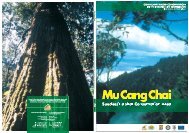Vietnam Primate Conservation Status Review 2002 - Hoang Lien ...
Vietnam Primate Conservation Status Review 2002 - Hoang Lien ...
Vietnam Primate Conservation Status Review 2002 - Hoang Lien ...
You also want an ePaper? Increase the reach of your titles
YUMPU automatically turns print PDFs into web optimized ePapers that Google loves.
<strong>Vietnam</strong> <strong>Primate</strong> <strong>Conservation</strong> <strong>Status</strong> <strong>Review</strong> Part 2: LEAF MONKEYS<br />
162<br />
5.1.5.5 <strong>Conservation</strong> status<br />
The Tonkin snub-nosed monkey is one of the world’s TOP 25 most endangered primate species<br />
(<strong>Conservation</strong> International and IUCN <strong>Primate</strong> Specialist Group, 2000).<br />
The species is considered as “Critically Endangered” in the IUCN Red List of Threatened Species<br />
(Hilton-Taylor, 2000) with the criteria CR C1, E. As result of the current status, R. avunculus should<br />
be listed with the criteria: CR B1, B2 abde, C1. (A quantitative analysis for the criteria E does not<br />
exist). In the <strong>Vietnam</strong>ese national list the species also has the status “Critically Endangered” (Pham<br />
Nhat et al., 1998)<br />
5.1.6 Recommendations for conservation in <strong>Vietnam</strong><br />
The conservation of the Tonkin snub-nosed monkey is one of the highest priorities in the domain of<br />
environmental protection in <strong>Vietnam</strong>. Immediate measures must be taken in order to increase the<br />
chances of survival for this species, which is almost condemned to extinction.<br />
5.1.6.1 Conduct further field status surveys<br />
✱ In Ha Giang Province there is only the recent sighting in Du Gia Nature Reserve. This<br />
province is within the historical range of this species. Further surveys should be carried<br />
out to assess the status of the species in this province<br />
✱ Two locations, Kinh Thiet Commune (Yen Son District, Tuyen Quang Province) and<br />
Ngoc Phai Commune (Cho Don District, Bac Kan Province) were respectively recorded<br />
in 1992 and 1993. However, these places have not been visited recently. According to<br />
forest cover, it is unlikely that these areas can support a large population of snubnosed<br />
monkeys. However, due to the global critically endangered status of this species,<br />
even the smallest groups should be identified, perhaps for a future translocation or<br />
captive breeding programme.<br />
✱ Further surveys are urgently needed in Phia Booc area (southeast of the proposed extension<br />
of Ba Be National Park). Information from local people reveals that the species may still<br />
occur in the area.<br />
5.1.6.2 Expansion of protected area network and improvement of protected area management<br />
✱ The two sectors of Na Hang Nature Reserve may possess the largest populations of R.<br />
avunculus. Special-use forest status has been approved by a Tuyen Quang People<br />
Committee’s Decision. However, the reserve has not yet been established by governmental<br />
decree so there is still the potential to revise the boundary in light of recent findings. The<br />
FFI survey in October-November 1999 found that the animals living in Ban Bung may<br />
cross the border with Ban Thi and Xuan Lac Communes (Cho Don District). The forested<br />
limestone hills located in these areas should be included in a future extension of the reserve<br />
(Boonratana, 1999). For administrative reasons and to enhance local community<br />
collaboration it may be better to gazette the forest in Xuan Lac commune adjacent to Na<br />
Hang Nature Reserve and Ban Thi commune as Species and Habitat <strong>Conservation</strong> area<br />
under the management of the commune and Cho Don District. With the presence of two<br />
globally threatened primate species, T. francoisi and R. avunculus, Na Hang Nature Reserve<br />
is of the highest priority for primate conservation.



